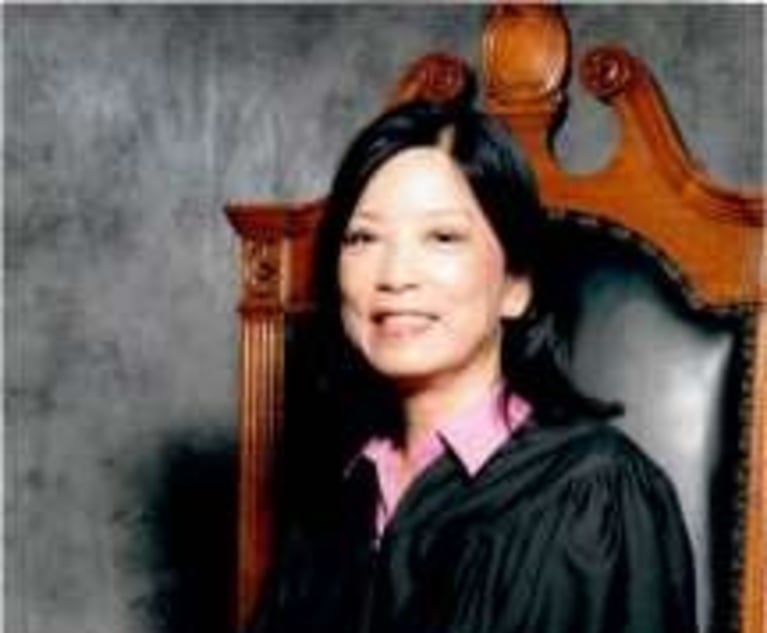Judge Allows Alternative Service on Elusive Civil Defendant
The court concluded Carmelle Danneman may serve her complaint upon the attorney for the defendant's adoptive father.
March 09, 2018 at 03:30 PM
3 minute read
 U.S. District Judge Richard Sullivan of the Southern District of New York. Photo: David Handschuh/NYLJ.
U.S. District Judge Richard Sullivan of the Southern District of New York. Photo: David Handschuh/NYLJ. A plaintiff in a civil lawsuit who says a man sexually assaulted her in her apartment but had failed for months to track him down may serve her complaint on lawyers for the defendant's guardian, a federal judge has ruled.
U.S. District Judge Richard Sullivan of the Southern District of New York took note of plaintiff Carmelle Danneman's repeated unsuccessful efforts to locate her alleged assailant, and found it increasingly appears that he is trying to avoid process of service. The court concluded Danneman may serve her complaint upon the attorney for the defendant's adoptive father.
Danneman, a 23-year-old actress, alleged in her complaint that she met a man at a dinner party in New York City who identified himself as Yosef Gerszberg. The man also goes by the name Surab Bilich, according to court papers.
Danneman alleges the defendant “invited himself” to her apartment, cornered her in her bedroom and sexually assaulted her.
Attorney Daniel N. Epstein of New Jersey-based Epstein Ostrove identified the defendant in the case as Bilich, and said he took on Bilich as a client Thursday after Danneman's attorney, Zachary Margulis-Ohnuma, filed an amended complaint.
Epstein said the suit defames his client and said it was filed as an attempt to extort money from the defendant's guardian, a wealthy textile entrepreneur who co-founded the Ecko Unlimited clothing brand.
When Danneman filed her original complaint in October, she named Gerszberg as the defendant. The suit was served on an address in Englewood, New Jersey, and was served upon a man identified as the defendant's “co-tenant,” according to court papers.
Epstein contacted Margulis-Ohnuma and said he represents Seth Gerszberg, who with clothing designer Marc Ecko and Ecko's twin sister co-founded Ecko Unlimited in 1993.
According to court papers, Gerszberg appeared at a Feb. 15 hearing and said that Bilich lives somewhere in Weehawken, New Jersey, but said he didn't have an exact address.
Under a court order, Gerszberg gave Margulis-Ohnuma a phone number and email address for Bilich, as well as his photograph; Danneman then identified the man in the photograph as the defendant referred to in her complaint.
Margulis-Ohnuma's attempts to reach Bilich by phone and email were unsuccessful and, a few days later, he found that a YouTube account and a Google Plus account that had been linked to the email address no longer existed.
Searches of online databases for an address for Bilich were also fruitless, court papers state.
Sullivan said that, when a defendant's whereabouts cannot be determined, New York law affords judges broad discretion to authorize an “indirect and probably even futile means of notification.”
And, the judge said, since Gerszberg and his attorneys had been in contact with Bilich, Danneman's proposed alternative method of service is reasonably calculated to give the defendant notice of the suit.
This content has been archived. It is available through our partners, LexisNexis® and Bloomberg Law.
To view this content, please continue to their sites.
Not a Lexis Subscriber?
Subscribe Now
Not a Bloomberg Law Subscriber?
Subscribe Now
NOT FOR REPRINT
© 2025 ALM Global, LLC, All Rights Reserved. Request academic re-use from www.copyright.com. All other uses, submit a request to [email protected]. For more information visit Asset & Logo Licensing.
You Might Like
View All
Haynes and Boone Expands in New York With 7-Lawyer Seward & Kissel Fund Finance, Securitization Team
3 minute read
Ticket-Fixing Scheme Results in Western NY Judge's Resignation—for a Second Time

Disbarred NY Atty Receives 54-Month Prison Sentence After $3M Embezzlement
3 minute read
Legal Community Mourns the Loss of Trailblazing Judge Dorothy Chin Brandt
Trending Stories
- 1Snap Paid $63M in Fees to 2 Am Law 200 Firms in '24
- 2Lawyers Across Political Spectrum Launch Public Interest Team to Litigate Against Antisemitism
- 3Jones Day Names New Practice Leaders for Antitrust, Business and Tort Litigation and Latin America
- 4Russia’s Legal Sector Is Changing As Sanctions Take Their Toll
- 5Government Contracting Clients Look to Firms to Stay on Top of Trump Policy Changes
Who Got The Work
J. Brugh Lower of Gibbons has entered an appearance for industrial equipment supplier Devco Corporation in a pending trademark infringement lawsuit. The suit, accusing the defendant of selling knock-off Graco products, was filed Dec. 18 in New Jersey District Court by Rivkin Radler on behalf of Graco Inc. and Graco Minnesota. The case, assigned to U.S. District Judge Zahid N. Quraishi, is 3:24-cv-11294, Graco Inc. et al v. Devco Corporation.
Who Got The Work
Rebecca Maller-Stein and Kent A. Yalowitz of Arnold & Porter Kaye Scholer have entered their appearances for Hanaco Venture Capital and its executives, Lior Prosor and David Frankel, in a pending securities lawsuit. The action, filed on Dec. 24 in New York Southern District Court by Zell, Aron & Co. on behalf of Goldeneye Advisors, accuses the defendants of negligently and fraudulently managing the plaintiff's $1 million investment. The case, assigned to U.S. District Judge Vernon S. Broderick, is 1:24-cv-09918, Goldeneye Advisors, LLC v. Hanaco Venture Capital, Ltd. et al.
Who Got The Work
Attorneys from A&O Shearman has stepped in as defense counsel for Toronto-Dominion Bank and other defendants in a pending securities class action. The suit, filed Dec. 11 in New York Southern District Court by Bleichmar Fonti & Auld, accuses the defendants of concealing the bank's 'pervasive' deficiencies in regards to its compliance with the Bank Secrecy Act and the quality of its anti-money laundering controls. The case, assigned to U.S. District Judge Arun Subramanian, is 1:24-cv-09445, Gonzalez v. The Toronto-Dominion Bank et al.
Who Got The Work
Crown Castle International, a Pennsylvania company providing shared communications infrastructure, has turned to Luke D. Wolf of Gordon Rees Scully Mansukhani to fend off a pending breach-of-contract lawsuit. The court action, filed Nov. 25 in Michigan Eastern District Court by Hooper Hathaway PC on behalf of The Town Residences LLC, accuses Crown Castle of failing to transfer approximately $30,000 in utility payments from T-Mobile in breach of a roof-top lease and assignment agreement. The case, assigned to U.S. District Judge Susan K. Declercq, is 2:24-cv-13131, The Town Residences LLC v. T-Mobile US, Inc. et al.
Who Got The Work
Wilfred P. Coronato and Daniel M. Schwartz of McCarter & English have stepped in as defense counsel to Electrolux Home Products Inc. in a pending product liability lawsuit. The court action, filed Nov. 26 in New York Eastern District Court by Poulos Lopiccolo PC and Nagel Rice LLP on behalf of David Stern, alleges that the defendant's refrigerators’ drawers and shelving repeatedly break and fall apart within months after purchase. The case, assigned to U.S. District Judge Joan M. Azrack, is 2:24-cv-08204, Stern v. Electrolux Home Products, Inc.
Featured Firms
Law Offices of Gary Martin Hays & Associates, P.C.
(470) 294-1674
Law Offices of Mark E. Salomone
(857) 444-6468
Smith & Hassler
(713) 739-1250






